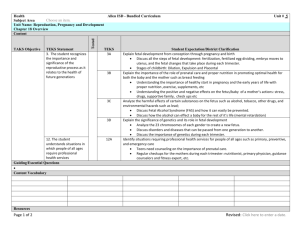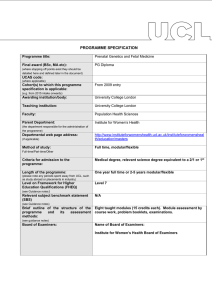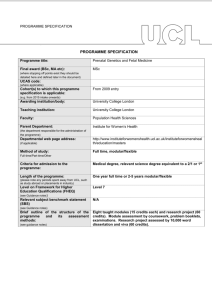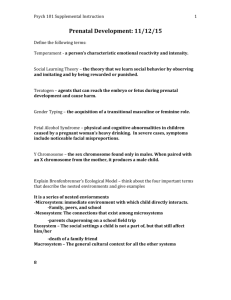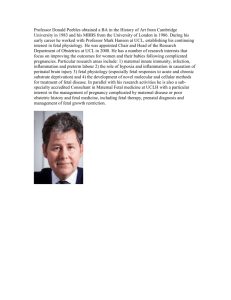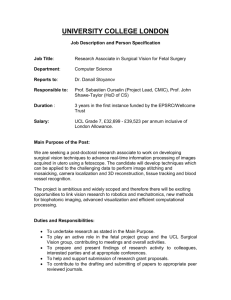PRENATAL GENETICS AND FETAL MEDICINE MSc / 2016/17 ENTRY
advertisement
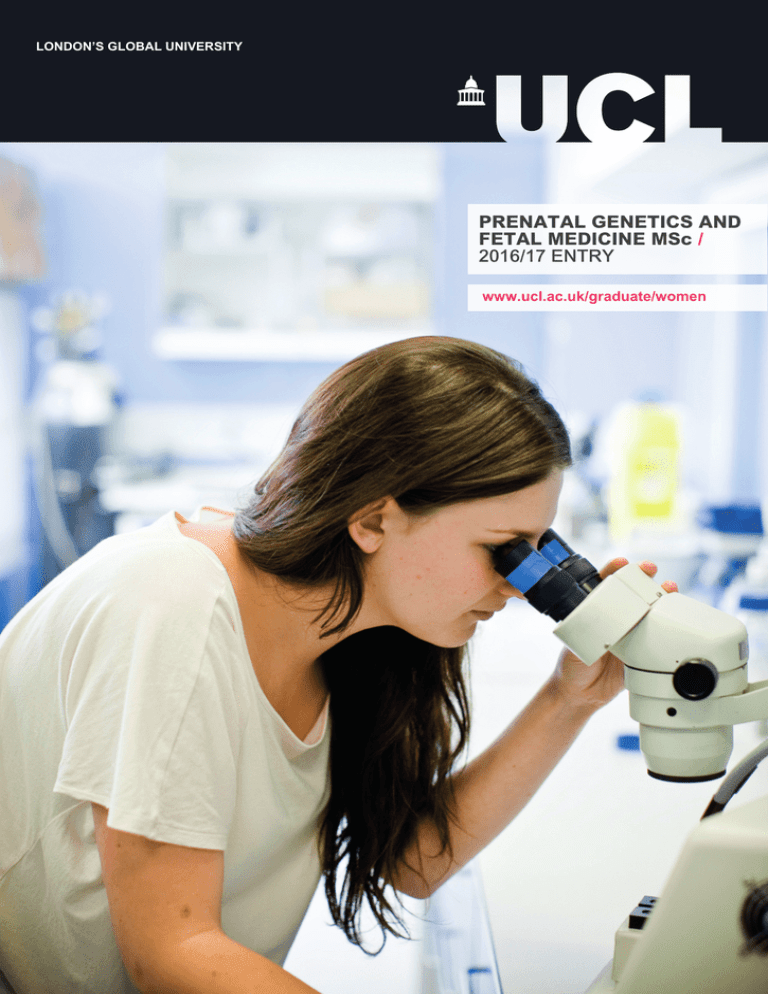
LONDON’S GLOBAL UNIVERSITY PRENATAL GENETICS AND FETAL MEDICINE MSc / 2016/17 ENTRY www.ucl.ac.uk/graduate/women Prenatal Genetics and Fetal Medicine MSc / This MSc aims to provide medical and science-based students with a comprehensive knowledge and understanding of the field of prenatal genetics and fetal medicine, specifically human genetics, human embryonic development and fetal medicine. There is a strong focus on development of key skills and careers advice in the programme. Degree summary Students will develop a knowledge and understanding of the field of prenatal genetics and fetal medicine, specifically in the areas of basic genetics and technology, genetic mechanisms, medical genetics, organogenesis and fetal development, gametogenesis and IVF, prenatal diagnosis and screening, fetal and perinatal medicine, and preimplantation genetic diagnosis and developing technology. They gain transferable skills including information technology, analysis of scientific papers, essay writing, seminar and poster presentation, research techniques, peer review and laboratory skills. // The UCL EGA Institute for Women’s Health provides an academic environment in which students can pursue graduate studies taught by academics and clinicians at the leading-edge internationally in a recognised centre of excellence. // The Institute brings together individuals with expertise across the whole spectrum of women's health - from laboratory science to clinical skills - with the objective of making a major contribution to the health of women, both in the UK and internationally, by pioneering research, education programmes and clinical initiatives. The programme is delivered through a combination of lectures, seminars, tutorials, practical demonstrations in laboratories, observation days in fetal medicine and IVF units, and student presentations. There are a number of peer-led learning activities. Assessment is through essays, patient case reports, critical reviews of papers, problem booklets, examinations and the dissertation. Degree structure Mode: Full-time: 1 year; Flexible: 2-5 years Students undertake modules to the value of 180 credits. The programme consists of eight core modules (120 credits) and a research project (60 credits). A Postgraduate Diploma consisting of eight core modules (120 credits, full time nine months, flexible study two-five years) is offered. CORE MODULES // Basic Genetics and Technology // Gametogenesis, Preimplantation Development and IVF // Genetic Mechanisms // Organogenesis and Fetal Development // Prenatal Diagnosis and Screening // Medical Genetics // Fetal and Perinatal Medicine // Preimplantation Genetic Diagnosis and Developing Technology OPTIONS // There are no optional modules for this programme. DISSERTATION/REPORT // All MSc students undertake a clinical, laboratory, audit or library-based research project, which culminates in a dissertation of 10,000 words. Your career On completion of the programme, all students will have gained knowledge of both the clinical and laboratory aspects of prenatal genetics and fetal medicine. This will enable the science-orientated students to go on to pursue research degrees, careers in embryology or prenatal diagnosis, or other careers in the field or in general science. The medically orientated students will be able to develop their careers in the field of fetal medicine. Recent career destinations* include: // Ente Ospedaliero Cantonale (EOC), Ticino, Switzerland, Obstetrics and Gynaecology Clinical Trainee, 2012 // // // // Oxford University Hospitals NHS Trust, Genetic Technologist, 2012 Cyprus Institute of Neurology & Genetics, PhD student, 2013 Nova IVI Fertility, India, Junior Embryologist, 2013 Ente Ospedaliero Cantonale (EOC), Ticino, Switzerland, Obstetrics and Gynaecology Clinical Trainee, 2012 Employability Throughout the MSc programme students learn key skills through peer-led activities, such as evaluating and presenting orally on patient cases and media coverage of scientific papers. Basic laboratory techniques are taught, such as PCR and FISH, as well as essay writing, critical evaluation of papers, debates and ethical discussions. We also offer a comprehensive careers programme involving our alumni, covering how to apply for a job, mock job applications, CV writing, general careers in science and specific career advice such as careers in embryology, clinical genetics and research degrees. * data taken from the ‘Destinations of Leavers from Higher Education’ survey undertaken by HESA looking at the destinations of UK and EU students in the 2010–2012 graduating cohorts six months after graduation and, where necessary, departmental records. Entry requirements Normally a minimum of an upper second-class Bachelor's degree in a relevant science-based discipline, or a medical qualification (MBBS) from a UK university or an overseas qualification of an equivalent standard. FEES AND FUNDING // UK & EU (2016/17) entry: £11,090 (FT) // Overseas (2016/17) entry: £25,140 (FT) // UK & EU (2016/17) entry: N/A (PT) English language proficiency level // Overseas (2016/17) entry: N/A (PT) If your education has not been conducted in the English language, you will be expected to demonstrate evidence of an adequate level of English proficiency. Full details of funding opportunities can be found on the UCL Scholarships website: www.ucl.ac.uk/scholarships The level of English language proficiency for this programme is: Standard. APPLICATION DATE Information about the evidence required, acceptable qualifications and test providers is provided at: www.ucl.ac.uk/graduate/english-requirements Your application The deadline for all applicants is 29 July 2016. Students are advised to apply as early as possible due to competition for places. Those applying for scholarship funding (particularly overseas applicants) should take note of application deadlines. When we assess your application we would like to learn: // why you want to study Prenatal Genetics and Fetal Medicine at graduate level // // // why you want to study Prenatal Genetics and Fetal Medicine at UCL // where you would like to go professionally with your degree what particularly attracts you to the chosen programme how your academic and professional background meets the demands of this programme Together with essential academic requirements, the personal statement is your opportunity to illustrate whether your reasons for applying to this programme match what the programme will deliver. Details on how to apply are available on the website at: www.ucl.ac.uk/graduate/apply PDF Updated: May 25, 2016 Information correct at time of going to press. See website (www.instituteforwomenshealth.ucl.ac.uk) for latest information All applicants: 29 July 2016 CONTACT Dr Angela Poulter Email: a.poulter@ucl.ac.uk Telephone: +44 (0)20 7679 6050
